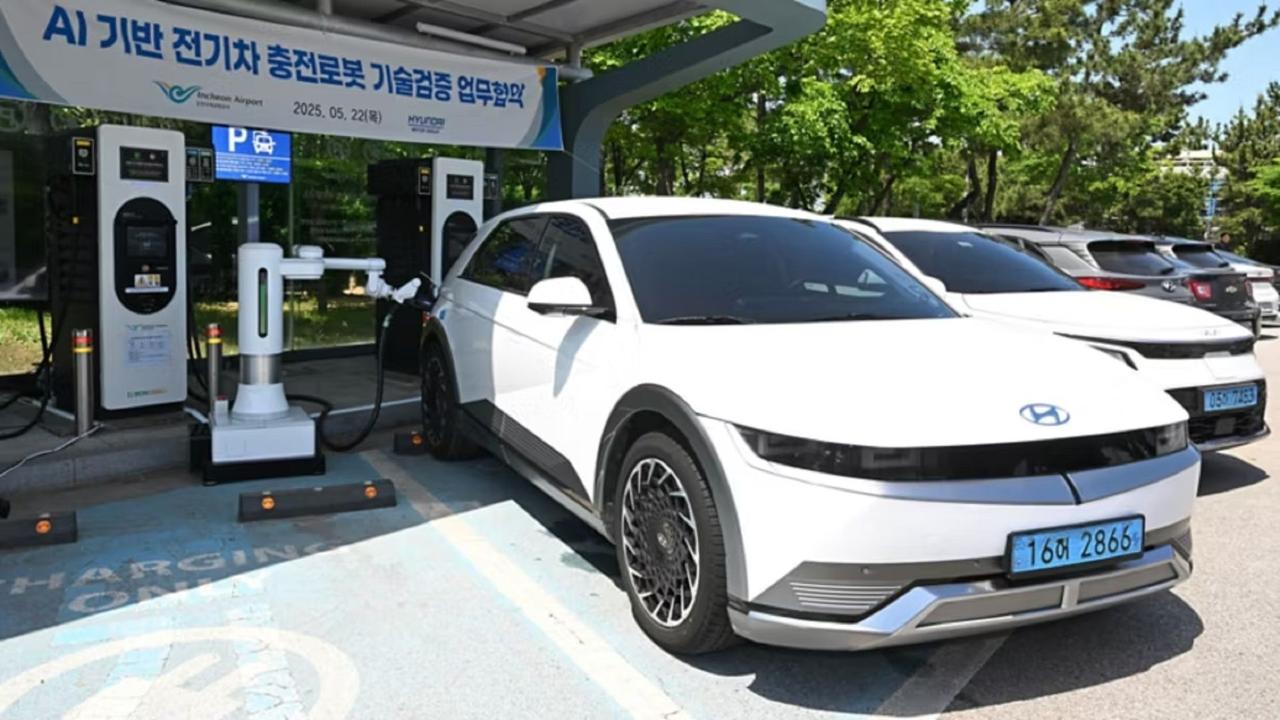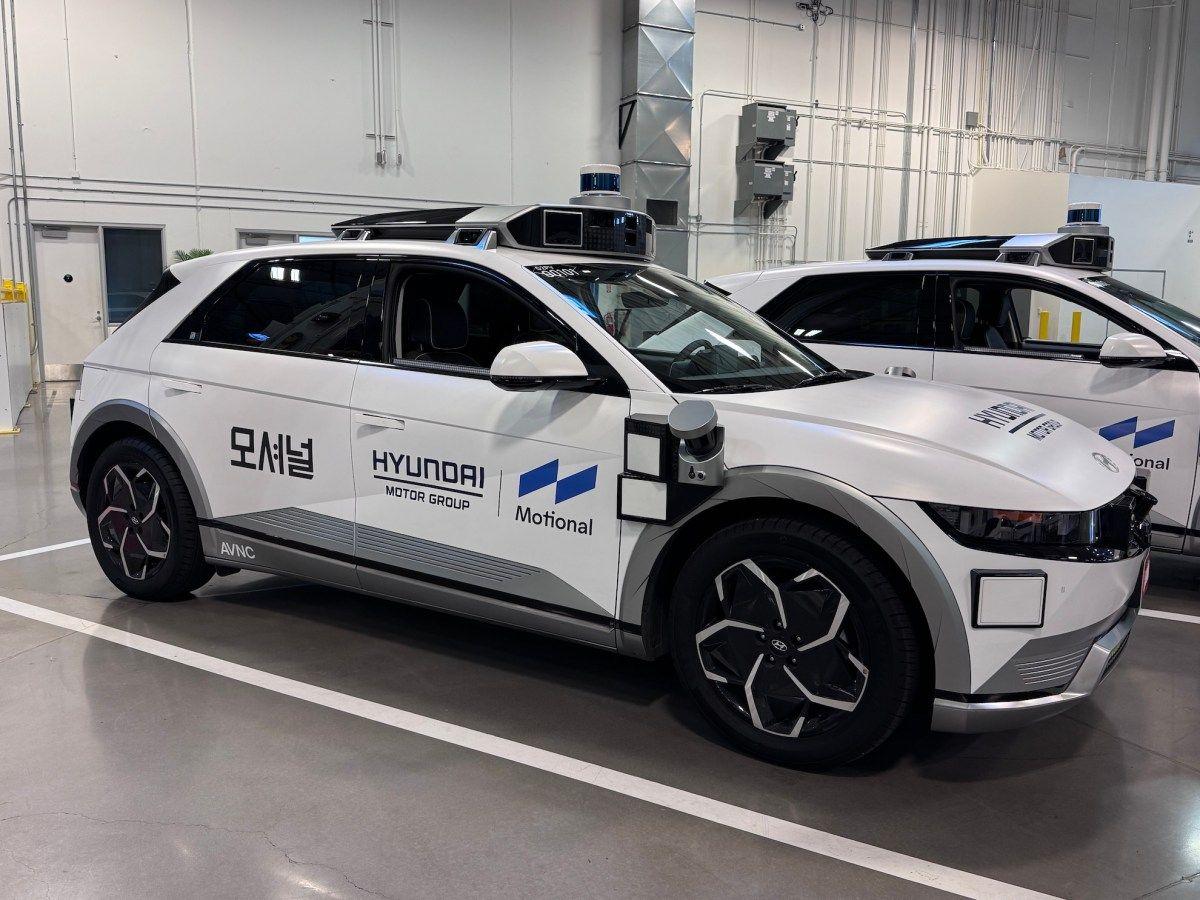Hyundai Deploys AI-Powered Robots for Automatic EV Charging at Incheon Airport
3 Sources
3 Sources
[1]
Hyundai's robo-charger tops up EVs at one of world's largest airports
Hag Jae Lee, President and CEO of Incheon International Airport Corporation (left), and Heui Won Yang, President and Head of the R&D Division at Hyundai Motor Group (right) Plugging in a charging cable to top up your electric car's battery is not exactly rocket science, but we're finally approaching the robot age so why not let the bots do it? That's just what Hyundai is aiming to do at an airport in South Korea. Though many drivers of electric vehicles won't find the process of plugging in problematic, others - such as those with personal mobility issues - may appreciate some help. And in the case of fully autonomous EVs, it might be considered rude to expect human passengers to get out and cable a robotaxi to a supercharger for a quick top up on the way to the airport. We've seen a few auto makers (including Tesla, VW and Ford) explore the idea of robot assistance, but those have so far been concepts and prototypes. Hyundai is actually moving toward commercial deployment. That's following prototype testing in 2023, where we first got to see the robot helper in action. Now the company has announced a demonstration project at Incheon International Airport near Seoul in South Korea, reportedly one of the largest airports in the world. The facility already has a bunch of charging stations spread over its sprawling complex, and is reportedly aiming to have more than a thousand up and running by 2026. Now Hyundai's AI-based automatic charging robots will be available at some of those "to enhance convenience and safety at the airport." The idea is that drivers park in a robo-assisted charging spot, the ACR system communicates wirelessly with the electric vehicle to gain access to the car's charging port. The bot's arm then uses camera sensors to extend the charging cable to the vehicle and plug in. Once the top-up session is complete, the cable is removed by the robot, the car's port closed and the charger returned to the ready position for the next customer. This ACR system received certification in Korea last year, and has also been tested to basic European safety standards. The technology has already been put through its paces at a "robot-friendly" factory in the nation's capital. The airport deployment is expected to serve as a development testbed and demonstrator as the partnership eyes expansion to "various domestic and international transportation infrastructures such as airports, seaports and railways." "This collaboration will serve as a significant milestone in verifying the practical benefits of future mobility technologies by combining Hyundai Motor Group's robotics and AI capabilities with Incheon International Airport Corporation's extensive operational experience," said Heui Won Yang, President of Hyundai's R&D Division. "Hyundai Motor Group aims to offer a more convenient and enhanced mobility experience through a customized automatic charging solution that can be used in any setting." "We expect this partnership to significantly enhance service and improve operational efficiency at Incheon International Airport," added Hag Jae Lee, President and CEO of Incheon International Airport Corporation.
[2]
Hyundai deploys AI robots to charge EVs at Incheon airport
Hyundai Motor Group -- which includes both Hyundai and Kia -- is bringing AI-powered charging robots to Incheon Airport, fusing future mobility with one of the world's busiest travel hubs. These AI-powered automatic charging robots (ACRs) will handle EV charging on their own, offering a faster, more convenient solution for travelers and airport operations alike. The move, part of a new partnership between Hyundai Motor Group and Incheon International Airport Corporation (IIAC), is aimed at testing how AI and robotics can make EV charging smarter and more efficient in busy public spaces. Through this pilot project, the airport will serve as a testbed for the Group's cutting-edge charging tech, which has already earned safety certifications in Korea (KC) and the EU (CE). Hyundai and Kia will work together to fine-tune the robots' hardware and software, while also exploring ways to link them with smart parking systems and gather real-time feedback from users. Backed by Hyundai's robotics expertise and Kia's system software development support, the charging robots are expected to play a key role in the airport's transformation into a next-gen "Aviation AI Innovation Hub" under the Incheon Airport 4.0 vision. Kia's R&D center in Hwaseong will also contribute to developing connected services that integrate with the charging system. For passengers, it could mean smoother EV charging with zero hassle. For the airport, it's a big step toward greener, tech-driven operations Heui Won Yang, who heads Hyundai Motor Group's R&D division, said the project is a big step in proving how future mobility tech like robotics and AI can make a real difference in everyday settings. "Hyundai Motor Group aims to offer a more convenient and enhanced mobility experience through a customized automatic charging solution that can be used in any setting. We also look forward to working with Incheon International Airport to build various mobility infrastructures and lead the future mobility ecosystem," he said in a release.
[3]
Check out Hyundai's new robot that will automatically charge your EV
How much easier can charging get? Hyundai and Kia want to make it effortless with their new robot that automatically charges your EV. If cars can drive themselves, why can't robots automatically charge your EV? That may soon be a reality after Hyundai Motor showcased its new automatic charging robots (ACRs) in Korea. Hyundai and Kia set up a demo site at the Incheon International Airport as part of a new business agreement. Through the agreement, Hyundai (and Kia) will work with the airport to establish an automatic robot EV charging service. Since Incheon International Airport has already electrified its entire fleet and plans to have 1,110 chargers by 2026, it is the perfect spot to test it out. The companies will use the demo site as a "stepping stone" with plans to expand into additional airports, seaports, railways, and other transportation hot spots. Hyundai Motor's head of R&D said the project is "a significant milestone in verifying the practical benefits" of robotic EV charging. Although several other companies, like Tesla and RAM (remember the Ram Charger?), have teased robot EV chargers in the past, Hyundai is one of the first to put them into action. Hyundai first introduced its automatic charging robot in 2023. Using a 3D camera system and AI, the robot will automatically find and plug into the vehicle's charge port. When you're done, it will remove the charger and close the cover. Check out the video above to see how it works on the IONIQ 6. The company expects that automatic charging robots will "significantly increase" the convenience of EV charging. With autonomous parking, the robots can charge several parked vehicles at the same time. Will we see Hyundai's robot EV chargers rolling around global airports in the future? It could soon be a reality.
Share
Share
Copy Link
Hyundai Motor Group introduces AI-based automatic charging robots (ACRs) at Incheon International Airport, marking a significant step towards automated EV charging in high-traffic areas.
Hyundai's Innovative Approach to EV Charging
Hundai Motor Group has taken a significant leap in electric vehicle (EV) charging technology by introducing AI-powered automatic charging robots (ACRs) at Incheon International Airport in South Korea. This move marks a transition from concept to real-world application in the realm of automated EV charging
1
.
Source: Interesting Engineering
The Technology Behind ACRs
The ACR system employs advanced technology to streamline the charging process:
- Wireless communication with EVs to access charging ports
- 3D camera sensors for precise cable extension and plugging
- AI-driven automation for the entire charging cycle
Once an EV is parked in a designated spot, the robot handles the entire charging process, from opening the charging port to plugging in and removing the cable upon completion
1
2
.Strategic Partnership and Testing
Hundai Motor Group has partnered with Incheon International Airport Corporation (IIAC) to implement this technology. The airport, one of the world's largest, serves as an ideal testbed for the ACRs:
- Already has numerous charging stations
- Plans to have over 1,000 charging points by 2026
- Aims to transform into an "Aviation AI Innovation Hub"
2
3
The ACR system has received certification in Korea and has been tested to meet basic European safety standards, paving the way for potential international expansion
1
.Implications and Future Prospects
The deployment of ACRs at Incheon Airport is more than just a convenience feature; it represents a significant step towards the future of mobility:
- Enhanced accessibility for users with mobility issues
- Preparation for fully autonomous EVs and robotaxis
- Potential for increased efficiency in high-traffic areas
Hundai and Kia are collaborating to refine both the hardware and software aspects of the ACRs, with plans to integrate them with smart parking systems and gather real-time user feedback
2
.Related Stories
Expanding Horizons
While Hyundai isn't the first to explore robotic EV charging – with companies like Tesla, Volkswagen, and Ford having shown prototypes – it is among the first to move towards commercial deployment
1
3
.The success of this project could lead to the expansion of ACR technology to various transportation infrastructures globally, including other airports, seaports, and railways
1
2
.Industry Impact and User Experience
For the automotive and transportation industries, this development signifies:
- A shift towards more automated, user-friendly charging solutions
- Potential for smoother integration of EVs into public transportation systems
- A step towards greener, technology-driven operations in high-traffic areas
2
For EV users, the ACRs promise a more convenient charging experience, potentially encouraging wider EV adoption by addressing concerns about charging complexity
3
.As this technology continues to evolve and expand, it could play a crucial role in shaping the future of EV infrastructure and urban mobility solutions.
References
Summarized by
Navi
[2]
Related Stories
Hyundai's AI-Powered Metaplant: Revolutionizing EV Manufacturing with Robotics and Automation
29 May 2025•Technology

Revel Integrates Juice's AI-Powered Face ID Technology into DC Fast Chargers
19 Sept 2024

Motional targets 2026 for driverless robotaxi service in Las Vegas with AI-first reboot
12 Jan 2026•Technology

Recent Highlights
1
Pentagon threatens to cut Anthropic's $200M contract over AI safety restrictions in military ops
Policy and Regulation

2
ByteDance's Seedance 2.0 AI video generator triggers copyright infringement battle with Hollywood
Policy and Regulation

3
OpenAI closes in on $100 billion funding round with $850 billion valuation as spending plans shift
Business and Economy





